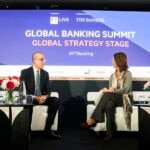FT Summit: Onur Genç urges European banks to scale up to become global players
BBVA’s CEO, Onur Genç, spoke on Tuesday at a financial event held in London to address the need to consolidate large European banks capable of leading an increasingly competitive global market: “Europe needs larger, stronger and more efficient institutions to support economic growth.” The combination between BBVA and Banco Sabadell is a major step forward in this direction. Not only will it benefit Spain, but it will also make the bank a stronger competitor on the global stage, supporting SMEs and financing high-impact projects, explained BBVA’s CEO at the Global Banking Summit organized by the Financial Times.

Genç cautioned that European banks risk falling behind their competitors in other regions if they fail to achieve sufficient scale. Despite Europe’s economic weight, no EU bank currently ranks among the world’s top 25 banks measured by stock market capitalization, a ranking currently dominated by banks from the United States, China and other economies such as India, Canada, Japan and Australia. Competition is also growing from outside traditional banking, driven by tech giants, thus adding to the pressure on European banks. “In our business, if you don't have scale, you simply can’t compete,” he explained. “We should be concerned about not having an EU bank in that ranking” to boost the region’s economic growth.
He believes that the first step should be the creation of larger-scale national champions before looking to undertake cross-border mergers. “Having local scale is important,” he remarked. More precisely, he explained that having a double-digit market share in any market is an absolute must.
During his presentation, BBVA’s CEO stressed that the capital market in Europe is much less mature than it is in the United States. Indeed, bank loans account for 75 percent of lending to corporates in the EU, while bond markets account for the remaining 25 percent, in stark contrast to the situation in the United States. Therefore, banks play a key role in channeling savings toward the investment we need to see in innovation and decarbonization, which are essential to ensure Europe’s competitiveness moving forward: “Europe needs growth, and the investment that banks can provide is essential for this.”
In his view, it is essential to achieve a true capital market union from a European perspective. BBVA’s CEO pointed out that the EU’s incomplete banking union and fragmented regulatory landscape make it harder for European banks to compete globally: “We really don’t have a single market in Europe to speak of.”
According to Genç, the transaction between BBVA and Banco Sabadell not only makes sense domestically, but also contributes toward the strategic vision and need to build a more competitive European banking industry. This is a view also shared by BBVA’s shareholders, who, at the General Shareholders’ Meeting held in July, voted overwhelmingly in favor of the capital increase needed for the combination to go ahead.

The BBVA CEO framed the transaction with Banco Sabadell in the context of the profound transformation currently sweeping the financial industry as a result of digitization and innovation. Customer interaction has largely shifted from physical to digital channels. This much is evident from the key figures reported by BBVA in recent years, showing that the bank has experienced a significant change in its interaction with customers: in the third quarter of 2024, 74 percent of them used mobile banking, compared to 35 percent in 2017. This shift has driven growth in digital sales, which have risen from 28 percent in 2017 to 78 percent in Q3 2024.
To support this transformation, BBVA has upped its technology investment from 21 percent of total costs in 2019 to 26 percent in 2023, reaching 30 percent in the case of Spain. Investment in technology is essential if we are to remain competitive in a rapidly changing environment and cement our leadership in digital banking. Genç remarked that the merger with Banco Sabadell will allow the fixed costs of technological investment to be diluted among a larger number of customers.
Finally, he pointed to Mexico’s strategic position as a market that offers unrivaled competitive advantages over other economies, especially in terms of labor costs: “Even if the United States ultimately raises tariffs, Mexico will remain a highly attractive market because of its significant cost advantages in manufacturing goods.” Genç is confident that any short-term volatility will soon stabilize, thanks to the sound structural fundamentals that make Mexico an attractive market for investors.
